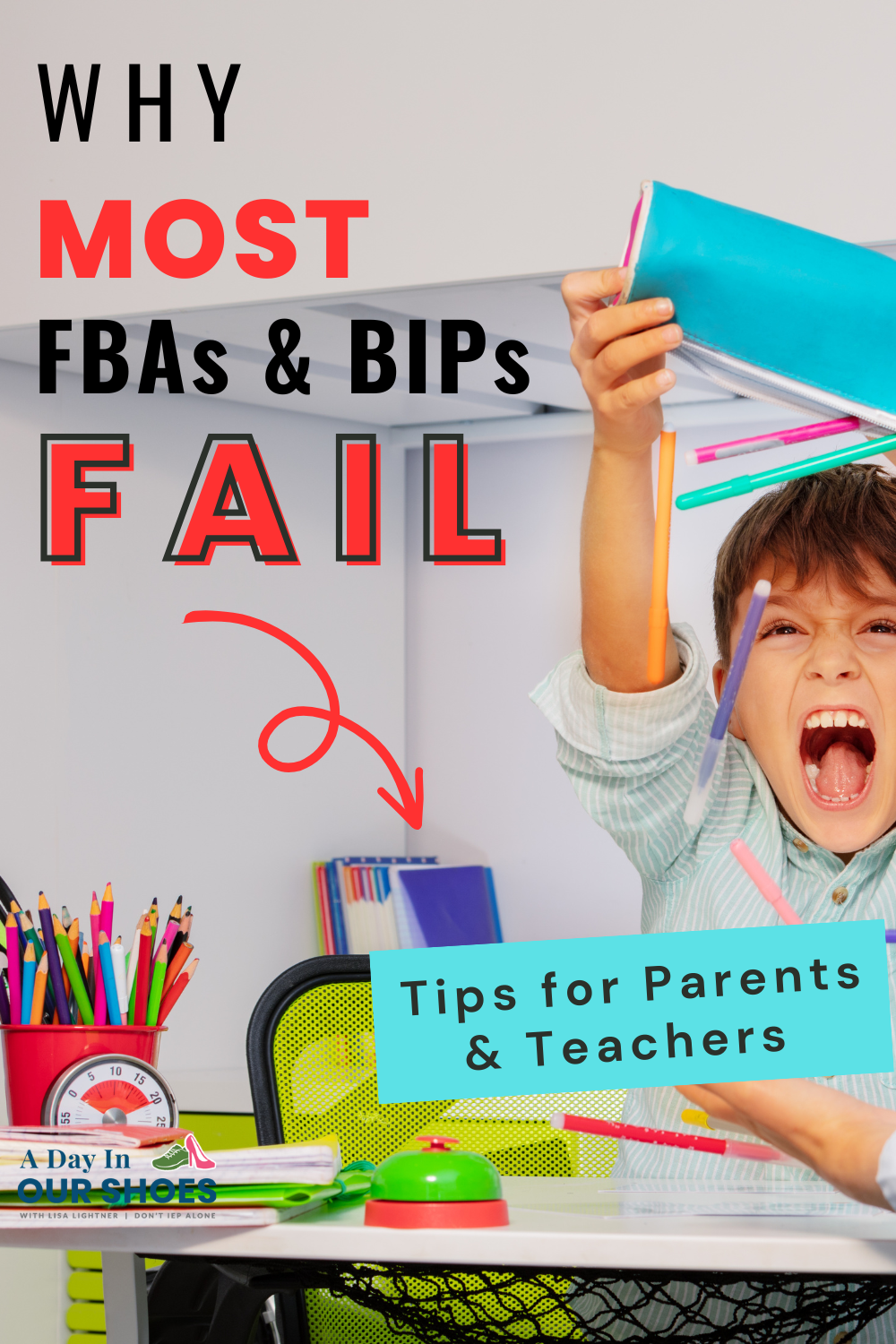Why So Many FBAs and Behavior Plans Fail
FBAs (Functional Behavior Assessments) and Behavior Plans are common components of IEPs. And after 14 years of advocacy, I’m still seeing the same issues over and over.
Most importantly—they often don’t work. The same kids are still being suspended, failing classes, and being ostracized by both peers and staff.

I’m going to outline some common themes that I see in insufficient FBAs and Behavior Plans. I have separate posts on both, if you wish to use the search bar on the right.
Adding: I want to thank everyone who reached out about this post. Yes, it’s a widespread issue. I’m sorry that so many of you are experiencing it, but it’s why I published it. Here are some reader comments.
What Are FBAs and Behavior Plans?
If you’re new to this, I have a more detailed post you can search for—but in short:
- FBA stands for Functional Behavior Assessment (or Analysis, depending on who you ask). It’s meant to figure out the “why” behind a student’s behavior.
- A Behavior Plan is developed based on the FBA. Its goal is to increase positive behavior and decrease negative behavior. Also known as BIP for Behavior Improvement Plan or PBSP for Positive Behavior Support Plan.
If you’re thinking about requesting an FBA, or your child already has a behavior plan that isn’t working, please read on.
Common Problems with FBAs
After almost two decades of being a special education advocate, behavior is the number one reason clients call me.
Anyone Can Do Them (Literally Anyone)
Unlike OT or PT evaluations, which require specialized professionals, IDEA doesn’t specify who must conduct an FBA. That means they’re often done by whoever is available (teachers, school counselors, SLPs) many of whom have little to no formal training in behavior analysis.
Best practice? Sure, a behaviorist or BCBA should be involved. But it’s not required, and the quality suffers as a result. You’d be surprised at how many districts do not employ BCBAs.
Even when BCBAs are involved, they usually have to do so many, that thorough ones are few and far between. I’ve seen large school districts (10k students+) employ one BCBA for the entire district.

They Don’t Go Deep Enough
Too often, FBAs stop at identifying the behavior and assigning one of the four common “functions.” That’s not enough.
Here’s a real example:
- Parent: My son has an FBA and Behavior Plan, but it’s not helping.
- Me: What did the FBA find?
- Parent: School refusal.
- Me: Why is he refusing school?
- Parent: They said anxiety.
- Me: Okay—but why does he have anxiety?
- Parent: Separation anxiety.
- Me: Why? What’s different about home vs. school? What is he getting at home—safety, predictability, comfort—that he’s not getting at school?
You get the idea. The FBA was satisfied with “school refusal” as an explanation. The behavior plan? Verbal prompts, rewards for showing up, and a cheerful greeting. No one ever asked what would actually make school feel safer for him.
Lather rinse repeat times 1000. Because I see this on so many IEPs, all day, every day. Which brings me to my next complaint about bad FBAs and Behavior Plans.
They Usually Put All the Responsibility on the Child
Most BIPs I see only list tasks for the child. Rarely are there any expectations for staff or school systems. The goals are often vague and unrealistic: “Child will begin attending school.” “Child will have fewer meltdowns.” That’s not a behavior intervention plan. That’s a wish list.
“Kids do well when they can.” – Dr. Ross Greene
They’re Used Without Implementing the IEP First
Too often, FBAs are rushed into when the IEP hasn’t even been fully implemented. Accommodations and supports aren’t being followed, and then the child gets blamed for behaviors. If the IEP isn’t being followed, of course behaviors will erupt. You’re putting demands on a child who doesn’t have the skills or supports to meet them.
Along these same lines, if the IEP is insufficient, and not addressing all of the child’s needs, behaviors will erupt. I take a lot of criticism for this philosophy on social media–but I believe it with every ounce of my being– If a child has the proper, appropriate IEP, and it’s being implemented with fidelity, FBAs and BIPs become unnecessary. Children very rarely act out when their needs are being met.
Two words: Attention Seeking. I swear to god if I see this on one more IEP, I am going to lose my shit. Please tell me what child wants to be mocked, ostracized and stared at by their peers? What kid wants to totally melt down in front of the entire class? For attention?

These kids are begging us for help. What they’re really seeking is:
- Connection
- Support
- Safety
- Coping skills
And the school responds with…verbal prompts and sticker charts.
When you call the behavior attention seeking, you’re assuming “won’t” instead of “can’t.” Try reframing it to a cry for help, rather than attention seeking. They just lack the skills to ask for help appropriately, or define and verbalize their struggles appropriately. And people ask for help because they need help. Not for attention.

FBAs rarely address past trauma. In over a decade, I’ve seen maybe 2 or 3 FBAs that even mention trauma—despite the fact that half of all children in the U.S. have experienced at least one Adverse Childhood Experience (ACE).
Trauma affects every part of a child’s development. It shortens life expectancy. It floods their nervous system. It makes it nearly impossible to thrive in school without targeted support. But schools rarely acknowledge it in behavior plans.
Adverse Childhood Experiences (ACEs) not only reduce our life expectancy by 20 years, but they also cause the following: lead children to spend most of their lives in fight-or-flight mode, making it difficult for them to build healthy relationships, thrive at school or maintain future employment.
Sound familiar? But guess what? We can heal from trauma! Divorce, death, job loss, pandemic, there are all kinds of trauma. Food insecurity, domestic violence, alcoholic parents, bullying…again, HALF of all kids have experienced an ACE of some kind.
Issues with Behavior Plans
Here’s where the phrase “garbage in, garbage out” applies. A weak FBA will lead to a weak behavior plan. But even when the FBA is halfway decent, most behavior plans still miss the mark.
They address the behavior rather than the lack of an underlying skill. Tell me if this sounds familiar–your child struggles with activities, like preferred vs. non preferred activities.
This is the type of garbage I see on behavior plans: The FBA determines that the undesired behavior appears most often during or preceding a non-preferred activity. Let’s say, reading/LA class. And the behavior plan calls for stupid things like ‘verbally preparing the child for the transition to LA class’ and ‘gets a sticker for attending LA class without incident.’
Or, one of my favorites, “Child will get 15 mins on ipad at the end of the day if they attend LA class without incident.” MEANWHILE THE CHILD CAN’T &**&$^&$ READ.
This IS WHY the child HATES reading class. They cannot read and it feels like everyone else around them can. And they feel isolated and lost….and don’t know how else to ask for help, so they act out. But back to above–the FBA too often doesn’t dig deep enough. And, the IEP is insufficient.

The child has to “earn” the accommodations and supports they need to be successful. “If the child behaves, they get a sensory break.”
No. That’s not how supports work.
The day that a child most needs a sensory break, is the day that he/she is least likely to earn one. If your behavior plan doesn’t take into account the child’s sensory profile, you’re wasting everyone’s time. A child in sensory overload will not care about your sticker chart. You cannot reward a kid out of a meltdown caused by overwhelming noise or movement or temperature.
Behavior strategies often force a child through their interoception. (click the word interoception if you don’t know what that is) Again, piggybacking on a crappy FBA, if you do not identify the sensory issues that a child might be having, all the stickers and ipad time in the world is not going to change it.
We have to acknowledge and validate and address that many kids have sensory experiences that we do not have. Doesn’t matter if it’s noise, visuals, temperature, movement, vestibular or whatever…you cannot reward a kid out of a negative interoceptive experience. Forcing them through it will likely only make the situation worse.
And when I suggest this at IEP meetings, I get a lot of sighing and pffft from staff. I’m not suggesting you change the entire classroom environment. There are small changes you can make, like sound canceling headphones. A different chair. And, teach the kid coping mechanisms!
Because lemme ask you this, schools–are your current strategies working? To force kids through things? I’d argue that they are not. Believe me, I’d love for my job to be obsolete.
Next Steps for Parents
Look, a child doesn’t get suspended or expelled from school because they didn’t eat lunch or have Cs in a class. They get suspended because of behaviors.
I know that many parents are going to read this and do a lot of head nodding, and have a lot of “aha!” moments.
So what next?
First, read up and learn all of your parental rights in the IEP process. Read your procedural safeguards. Be an active IEP team participant all year long, not just during the IEP process.
Use your rights to make sure that your IEP is sufficient and being followed. Be relentless.
Do not agree to an FBA unless you are certain that the IEP is being followed with fidelity. Use the old “IEP wait and see” on them.
Instead of consenting to the FBA, do a “well, let’s wait and see what happens after the IEP is followed consistently for 2 months to see if supportive accommodations reduce behaviors.”
Communicate everything in writing and use their language.
Most importantly–ask your child! This may not happen in one dinner conversation or car ride. But keep asking–why are they doing this? What do they like and dislike about school? What is hard about school? What would they like to change about school?
These kids don’t need punishments or prizes. They need safety, support, and someone who’s willing to go deeper and actually listen.
Because again:
“Kids do well when they can.”
Let’s start acting like we believe that.
- What to Do When your Child Keeps Getting Sent Home from School for Behaviors
- A Better Understanding of the 4 Functions of Behavior and your FBA/Behavior Plan or IEP
- Can you have an IEP for Behavior?
- Active Ignoring: Is it a “thing?” Does it really work for behaviors?
- 39 Behavior IEP Goals including Adaptive Behavior and Adaptive Skills
- Can Students be Excluded from Field Trips for Behavior? It depends.
- 6 Replacement Behaviors for Hitting and Aggression
- The Many Flaws of School FBAs and Behavior Plans
- My child has an IEP Behavior Plan. He’s still getting in trouble.
- What is an FBA in Special Education? Is it part of an IEP?
- 14 Sample Elopement IEP Goals for Autism and Other Learning Disabilities
- Understanding Restraint or Seclusion in Your Child’s School: What Every Parent Needs to Know and How to Take Action
- Behaviors and Classifications for Black Students with IEPs (video)








